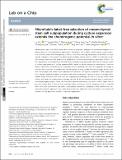Microfluidic label-free selection of mesenchymal stem cell subpopulation during culture expansion extends the chondrogenic potential
Author(s)
Yin, Lu; Wu, Yingnan; Yang, Zheng; Tee, Ching Ann; Denslin, Vinitha; Lai, Zhangxing; Lim, Chwee Teck; Lee, Eng Hin; Han, Jongyoon; ... Show more Show less
Downloadc7lc01005b.pdf (4.442Mb)
PUBLISHER_CC
Publisher with Creative Commons License
Creative Commons Attribution
Terms of use
Metadata
Show full item recordAbstract
Mesenchymal stem cells (MSCs) have been shown as potential candidates for cell-based therapies for a diverse range of tissue regenerative applications. Therapeutic use of MSCs usually requires culture expansion, which increases the heterogeneity of MSCs in vitro, thus affecting the potency of the MSCs for more specific indications. The capacity for identifying and isolating special subsets of MSCs for treatment of specific diseases therefore holds great clinical significance. An important therapeutic application of MSC is for the regeneration of cartilage tissue. We and others have previously developed label-free microfluidic means to isolate subpopulations of culture expanded MSCs based on distinct biophysical characteristics. Here we utilize a spiral micro-channel device to separate culture expanded MSCs into five subgroups according to cell size, and study their proliferation and chondrogenesis at early, middle and late passages. Results show that in all passages, the medium-size subpopulation (cell size of 17-21 μm), compared to other subpopulations, displays significantly higher proliferation rate and chondrogenic capacity in terms of cartilage extracellular matrix formation. Also, the small cell subpopulation (average cell size of 11-12 μm) shows lower viability, and large cell subpopulation (average cell size 23-25 μm) expresses higher level of senescence-associated β-galactosidase. Finally, we show that repeated microfluidic exclusion of MSCs larger than 21 μm and smaller than 17 μm at every passage during continuous culture expansion result in selected MSCs with faster proliferation and better chondrogenic potential as compared to MSC derived from conventional expansion approach. This study demonstrates the significant merit and utility of size-based cell selection for the application of MSCs in cartilage regeneration.
Date issued
2018-02Department
Massachusetts Institute of Technology. Department of Biological Engineering; Massachusetts Institute of Technology. Department of Electrical Engineering and Computer ScienceJournal
Lab on a Chip
Publisher
Royal Society of Chemistry (RSC)
Citation
Yin, Lu et al. “Microfluidic Label-Free Selection of Mesenchymal Stem Cell Subpopulation During Culture Expansion Extends the Chondrogenic Potential in Vitro.” Lab on a Chip 18, 6 (2018): 878–889 © 2018 Royal Society of Chemistry
Version: Final published version
ISSN
1473-0197
1473-0189